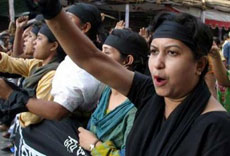|
Bangladesh Blasts to Send Message Not Kill: Experts
 |
|
Activists of Bangladesh’s "Islamic Islami Okeya Jote" march in Dhaka against the blasts. (Reuters)
|
Additional
Reporting by Ahmed Fathy, Fikry Abdeen,
Zafarul-Islam Khan
DHAKA,
August 18, 2005 (IslamOnline.net & News Agencies) – The
near-simultaneous nationwide bomb blasts that rattled
Bangladesh
Wednesday, August 17, were likely meant to flex muscles rather than to
kill, foreign experts have said.
"This
is the first time that so many explosions take place almost
simultaneously across the country," Abdul Hafiz Al-Sawi, an
expert in the sub-Indian continent affairs, told IslamOnline.net
Thursday, August 18.
"Judging
from the limited impact of the blasts and the use of home-made bombs,
the attackers wanted to send a clear message rather than cause a
carnage."
The
bombs, which killed a man and a 10-year-old boy and wounded more than
100 people, exploded in all but a few of the country’s 64 cities
between
10:30 am
and
11:30 a.m.
(0430 and 0530 GMT).
Although
no group has yet claimed responsibility for the orchestrated
nationwide attacks, police said they have found leaflets bearing the
name of the recently banned Jamaat-ul-Mujahideen group.
Police
said Thursday they had rounded up almost 90 people in the wake of the
attacks, reported Agence France-Presse (AFP).
"One
of them has confessed that he was Jamayet-ul-Mujahideen's local leader
and that he carried out an attack here," said Abdur Rahim,
superintendent of police in Satkhira district, where two people were
detained.
Jamayet-ul-Mujahideen
is led by the so-called "Bangla Bhai" who has been on the
run since his group was banned in February, according to IOL’s
Correspondent.
His
spiritual leader is said to be Rajshahi University Professor Mohamamd
Galib, now jailed on bombing charges.
Bangladesh
is the world's third largest Muslim-majority nation with a population
of 140 million.
Flexing
Muscles
Asked
what might have driven the group to use violence, Al-Sawi cited
"rampant economic and political corruption in
Bangladesh
."
Foreign
analysts also believe the attacks were motivated more by domestic
issues than international politics, reported the Daily Star.
Jennifer
Harbison, research director of information services at the Control
Risks Group, a London-based security consultancy, told Bloomberg that
the attackers may have intended to "flex their muscles,"
discredit the government and recruit new members, rather than kill.
"It
looks like they geared up for a big bang and so it's not likely that
there will be another immediate attack on this scale."
Sajjan
Gohel, a security analyst of the London-based Asia Pacific Foundation,
agreed.
"It
was a widespread attack that doesn't appear to have targeted one
group."
He
said it was unlikely that the attackers are linked to larger
international terrorist organizations, such as Al-Qaeda, given the
nature of the devices and the damage inflicted.
Security
Crisis

|
|
Women activists of the opposition Awami League Party protest the bomb blasts. (Reuters) |
The
orchestrated attacks have raised tough questions about security in the
South Asian country.
"Whoever
did this made a big statement. It shows how fragile the security
situation is here," Sakhawat Hossain, a former army Brigadier
General, told AFP.
"In
terms of security, it shows that we are now the weakest country in
South Asia, even weaker than
Nepal
," Hossain said.
Bangladesh
has a long history of political violence, labor strife and gang
warfare, according to IOL’s Correspondent.
But
Wednesday's blasts turned the focus on the presence of extremist
group, who have been blamed in the past for bomb explosions at
religious shrines and rallies.
Early
this year, former
Bangladesh
finance minister S.A.M.S. Kibria, was killed by militants, sparking
protests by opposition against violence in the region.
In
another carnage last November, former prime minister Sheikh Hasina
herself was injured.
Neighboring
India
has recently said it was concerned at what it called the rise of
"Islamic fundamentalism" in
Bangladesh
.
"It
(
Dhaka
) has remained indifferent to the rising influence of political
parties and organizations of fundamentalist and radical Islamist
orientation in Bangladeshi society and government," the Indian
Defense Ministry had said.
The
blasts were vehemently protested by the political parties in
Bangladesh
, including the ruling
Bangladesh
National Party (BNP) and the main opposition Awami League, Reuters
said.
"The
nation will not tolerate any sort of extremism in the name of
religion. Our religion Islam is a religion of peace and it opposes
terrorism," Abdul Mannan Bhuiyan, a senior minister and
secretary-general of the BNP, told a rally.
Opposition
parties have also called for a day-long countrywide protest strike on
Saturday.
"The
bomb attacks were a conspiracy against the nation. A vested quarter
deliberately did it to brand Muslims as terrorists," Mohammad
Hanif, a leader of Awami League, told another rally.
|